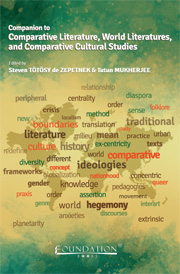Book contents
- Frontmatter
- Contents
- Introduction to the Companion to Comparative Literature, World Literatures, and Comparative Cultural Studies
- PART 1 Theories of Comparative Literature, World Literatures, and Comparative Cultural Studies
- PART 2 Comparative Literature in World Languages
- African Literatures as World Literatures
- Comparative Literature in Arabic
- Comparative Poetics in Chinese
- Comparative Literature in French
- Comparative Literature in German
- Comparative Literature in Iberian Spanish and Portuguese
- Comparative Literature in Indian Languages
- Comparative Literature in Italian
- Comparative Literature in Latin American Studies
- Comparative Literature in Russian and in Central and East Europe
- Comparative Literature in the United States
- PART 3 Examples of New Work in Comparative Literature, World Literatures, and Comparative Cultural Studies
- PART 4 Multilingual Bibliography of Books in Comparative Literature, World Literatures, and Comparative Cultural Studies
- Index
Comparative Literature in Russian and in Central and East Europe
from PART 2 - Comparative Literature in World Languages
Published online by Cambridge University Press: 05 April 2014
- Frontmatter
- Contents
- Introduction to the Companion to Comparative Literature, World Literatures, and Comparative Cultural Studies
- PART 1 Theories of Comparative Literature, World Literatures, and Comparative Cultural Studies
- PART 2 Comparative Literature in World Languages
- African Literatures as World Literatures
- Comparative Literature in Arabic
- Comparative Poetics in Chinese
- Comparative Literature in French
- Comparative Literature in German
- Comparative Literature in Iberian Spanish and Portuguese
- Comparative Literature in Indian Languages
- Comparative Literature in Italian
- Comparative Literature in Latin American Studies
- Comparative Literature in Russian and in Central and East Europe
- Comparative Literature in the United States
- PART 3 Examples of New Work in Comparative Literature, World Literatures, and Comparative Cultural Studies
- PART 4 Multilingual Bibliography of Books in Comparative Literature, World Literatures, and Comparative Cultural Studies
- Index
Summary
Abstract: In their article “Comparative Literature in Russian and in Central and East Europe” Alexandra Berlina and Steven Tötösy de Zepetnek present aspects of the history and current situation of comparative literature in the languages of the region. They describe briefly the evolution of comparativism in the study of literature from the nineteenth century to present from the perspectives of intellectual direction and institutional presence. The situation of comparativism in the study of literature and culture in the region suggests that comparative literature—to various degrees according to location—has been experiencing a development in particular since the end of the Soviet empire and communism.
Comparative literature in Russian
Galin Tihanov argues that modern literary theory originated in Central and East Europe (see “Why Did”). This is an interesting proposition because his discussion is about Russian thought and Central and East Europe does not include Russia—that is, from a “Western” perspective, although for West-oriented Russians Russia is part of Europe—and the designation is useful when one considers intellectual history based on “regions” of thought instead of geographical, political, historical, and sociological parameters (see also Dobrenko and Tihanov; on the definition of Central and East Europe, see Tötösy de Zepetnek, e.g., “Post-colonialities,” “Comparative”).
In Russian the first professorship of “world literature” was established in 1860 at the University of St. Petersburg. Fedor Buslaev (1818–1898) was the first to lecture in the field and his student Alexander Veselovsky (Veselovskii; 1859–1906) became its first official department head in 1870 (see Shaitanov, Komparativistika).
- Type
- Chapter
- Information
- Companion to Comparative Literature, World Literatures, and Comparative Cultural Studies , pp. 337 - 352Publisher: Foundation BooksPrint publication year: 2014

